London 2012: Disabled fans on Paralympics experience
- Published
With its sold-out venues, buzzing atmosphere and widespread media coverage, London 2012 is being described as a watershed for Paralympic sport.
The British public have taken disabled athletes to their hearts in the same way as they lauded Team GB's Olympic heroes.
With the Paralympics fully factored into the planning of the Olympic Park's design, disabled fans have praised the accessibility and extra facilities provided at London 2012 venues.
Door frames are wide enough for wheelchairs, the signage has been celebrated, extra ramps have been laid on, as well as extra spaces for wheelchairs at venues.
Audioloops providing enhanced radio commentary - at no charge for visually impaired fans - are available for Paralympics athletics, table tennis, judo, equestrian events, shooting, archery, football, wheelchair fencing and the ceremonies.
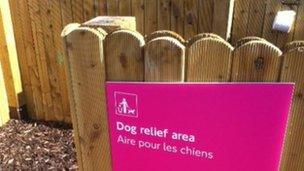
There are even so-called relief areas for guide dogs - complete with loo roll.
But there have been some glitches.
Former Home Secretary David Blunkett was turned away from one seat at the opening ceremony because there was no space for his guide dog.
The Goalball venue's audio-loop system originally merely amplified the stadium's sound system - good for deaf people but less useful for blind fans of a sport mostly played by blind athletes.
Where weaknesses have been identified and complaints made, organisers have worked quickly to rectify the situation.
So how have disabled people and wheelchair-users found the Paralympic experience?
STEVEN ANDERSON
Keen goalball player Steven Anderson, 21, from Harrow, said he had enjoyed explaining the rules of the sport to fellow spectators who had never experienced the game before.
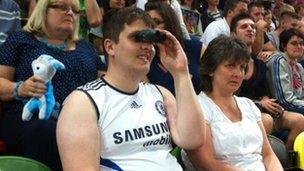
Steven Anderson has been explaining the rules of goalball to spectators
The university politics student - who is registered blind - is able to see the same at four metres as a fully sighted person can see at 60m.
He said the success of the Paralympics meant a lot to disabled people and that his experience compared favourably to that of other sporting events - such as football matches at Wembley.
"But let's not get too excited," he added.
"The reason why there's so many people coming is because of the success of the Olympics.
"If you look at the statistics, three-quarters of the tickets for the Paralympics were sold during or after the Olympics themselves, so it's not all everyone getting focused on disability. But any way is a good way."
Mr Anderson decried the faux-pas of David Blunkett's guide dog being refused access in the Olympic Stadium and said the initial lack of audio commentary for blind people at the goalball stadium was disappointing if not surprising.
While grateful for the offers of help from volunteers on the park, Mr Anderson said some seemed unable to take "no" for an answer and he found the "good Samaritan" attitude a little over-cooked.
On the positive side, the Leicester University student said improvements to London's transport system were impressive.
"They've got the tactile lines on the trains perfectly set-out. I believe the signage is very good and the wheelchair access is also very good.
"If they build on that and make sure the stations are well-staffed and they are well-trained, and they get that balance right then the legacy will be absolutely fantastic."
CLAIRE MALONE
Claire Malone, 22, said she had enjoyed the atmosphere on the park.
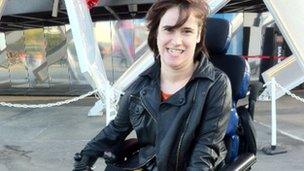
Claire Malone watched seven-a-side football at the Paralympics
"Everywhere was accessible," said the physics student from Harrow.
Watching the seven-a-side football was the first experience of a major sporting event and she loved supporting the British team, she said.
But the wheelchair-user with cerebral palsy added that more Paralympic sport should be shown on television
"I hope it will be noticed more and inspire more people to take up sport," she added.
LESLEY NELHAMS
Lesley Nelhams travelled to the park with eight students - with Down's Syndrome, cerebral palsy or autism - and 10 staff from Lindon Bennett Special Education Needs school, external near Heathrow.
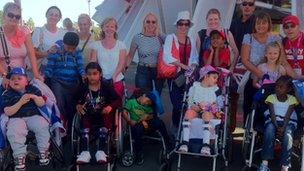
Lesley Nelhams took eight students to the Olympic Park
The children enjoyed a Brazil-Ukraine football game and Ms Nelhams praised the site's facilities - especially for wheelchair-users.
"It was really good coming from the station, as organisers provided special buses for wheelchairs from Stratford station," she said.
But she was disappointed when some of the children in buggies were made to use a different route into the park than those with wheelchairs.
"They split us up even though we're one group - that was a bit frustrating," she said.
EMILY YATES
Twenty-year-old games-maker Emily Yates from Leeds worked with the warm-up team for wheelchair fencing at the Excel.
The wheelchair-using university student has had cerebral palsy since she was nine and said that London 2012 had been a step-change in attitudes towards disabled sport.
"The Paralympics are important because we are the generation that have Paralympic idols, just as others have Olympic idols - that's special," she said.
"This cloud of limitation has just started to really lift and uncover this equality - it's fantastic."
MAURICE COLLINGS
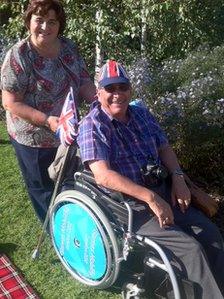
Maurice and Elaine Collings failed to get Olympic tickets
Seventy-six-year-old Maurice Collings from Letchworth went to see Paralympic athletics with his wife, Elaine.
They had tried and failed to get Olympic tickets.
With limited mobility but unable to walk long distances, Maurice said he had been helped on to the Javelin train service, was guided through a short-cut to the Olympic Park and was given a wheelchair to use on the site for free.
"It's been second to none, with help every step of the way.
"We hadn't even booked anything in advance.
"We didn't bring a wheelchair with us because we thought it would be a pain and were anxious about it."
Looking around the park, 62-year-old Elaine said: "Five pounds each for all this - what can you say?!"
- Published7 September 2012
- Published4 September 2012
- Published4 September 2012
- Published4 September 2012
- Published5 September 2012